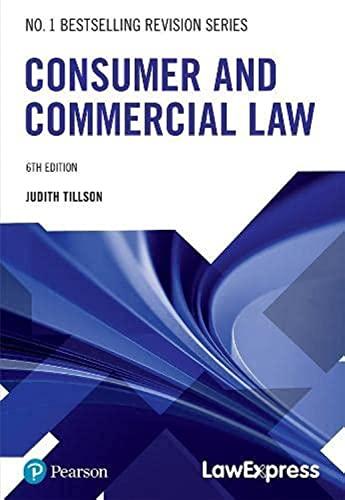Question
Hills Hotels, Inc. v. Jill John and Jane Smith owned Smith, Inc., a business selling cotton bedding to commercial buyers, in Indiana. On November 1,
Hills Hotels, Inc. v. Jill John and Jane Smith owned Smith, Inc., a business selling cotton bedding to commercial buyers, in Indiana. On November 1, 2019, their firm was contracted to supply Hill Hotels, Inc., a hotel chain, with bed sets for one of their newly opened hotels. Smith, Inc. did not have the product currently in stock so they ordered it from their supplier. A week later Hills Hotels, Inc. pre-paid for their order. A month later John and Jane Smith filed for personal bankruptcy but they did not dissolve their business. However, the entire stock of Smith, Inc. became part of John and Jane Smith's bankruptcy estate. When Hills Hotels, Inc. asked Jack Jill, the owner of the warehouse which contained Smith, Inc.'s stock, to open the premises and let them take the goods they considered theirs, Jack Jill declined as he was afraid that he could be considered liable for the missing stock. Jill sued Smith, Inc., which owned him money and the court granted summary judgement in favor of Jill. Hills Hotels, Inc. appealed, maintaining that the sale of the bed sets was completed and the title was passed when the sale was made. They argued that the court granted Jill summary judgement improperly because Hills Hotels, Inc. held the title for the goods and therefore has possessory interest. Hills Hotels, Inc. admitted that their contract did not have an explicit agreement to pass title at any other time, or at any time prior to actual delivery of the bed sets. The terms of the contract required Smith, Inc. to not only order the cotton bedding from their supplier but also to deliver it to the business premises of Hills Hotels, Inc. The Indiana UCC states that, unless explicitly agreed, title passes to the buyer at the time and place at which the seller completes his performance with respect to the physical delivery of goods. Taking the above into account, would you affirm or reject the summary judgement* in favor of Jill? Why? *Summary judgment is a judgment entered by a court for one party and against another party summarily, i.e., without a full trial. Simply put, the above question asks whether you would rule in favor of Jill? Please provide a brief 3-5 sentence explanation of your reasoning.
Step by Step Solution
There are 3 Steps involved in it
Step: 1

Get Instant Access to Expert-Tailored Solutions
See step-by-step solutions with expert insights and AI powered tools for academic success
Step: 2

Step: 3

Ace Your Homework with AI
Get the answers you need in no time with our AI-driven, step-by-step assistance
Get Started


